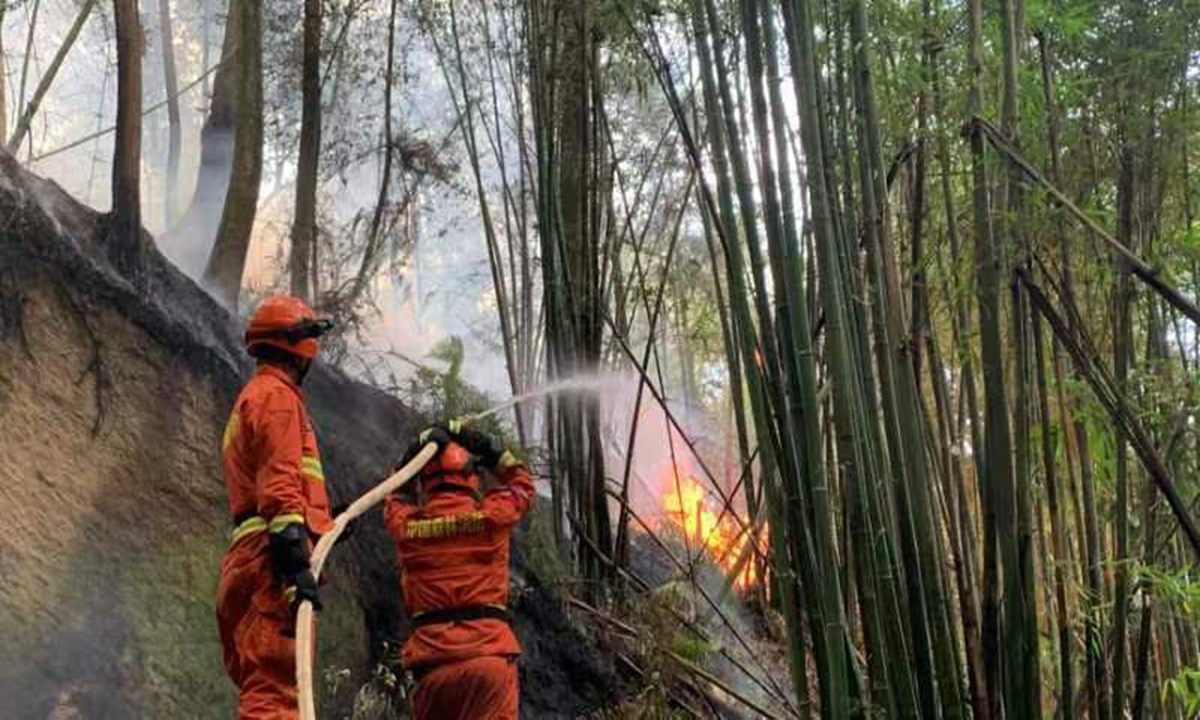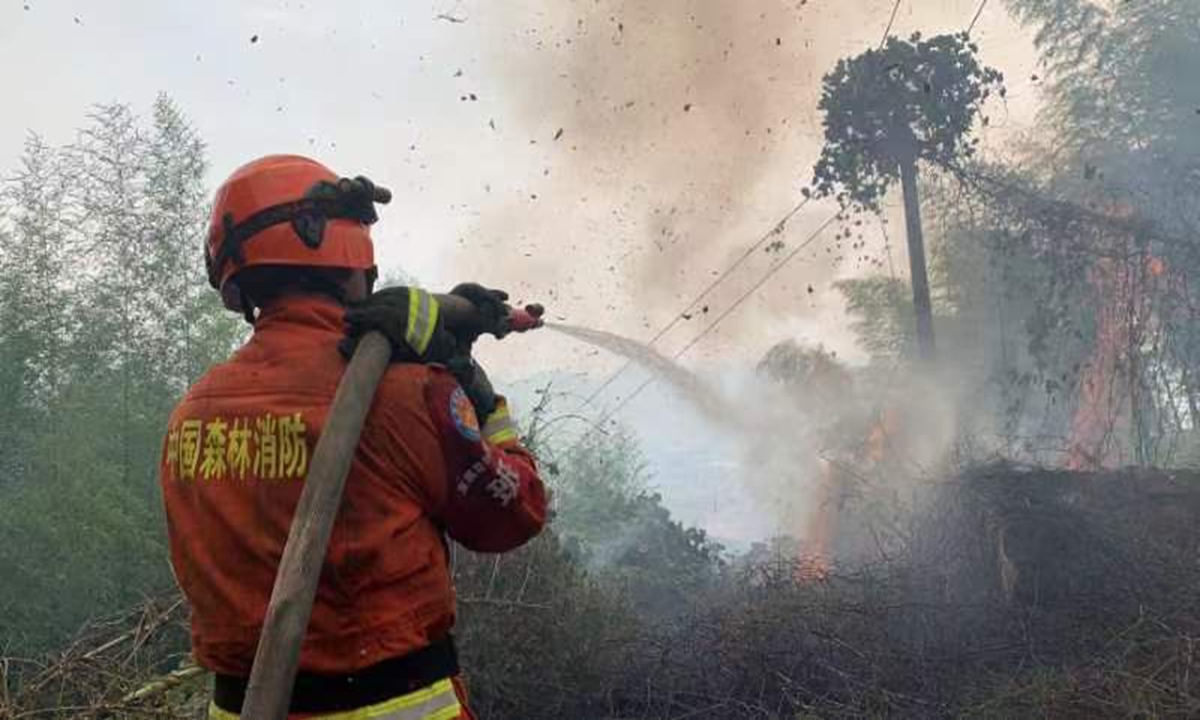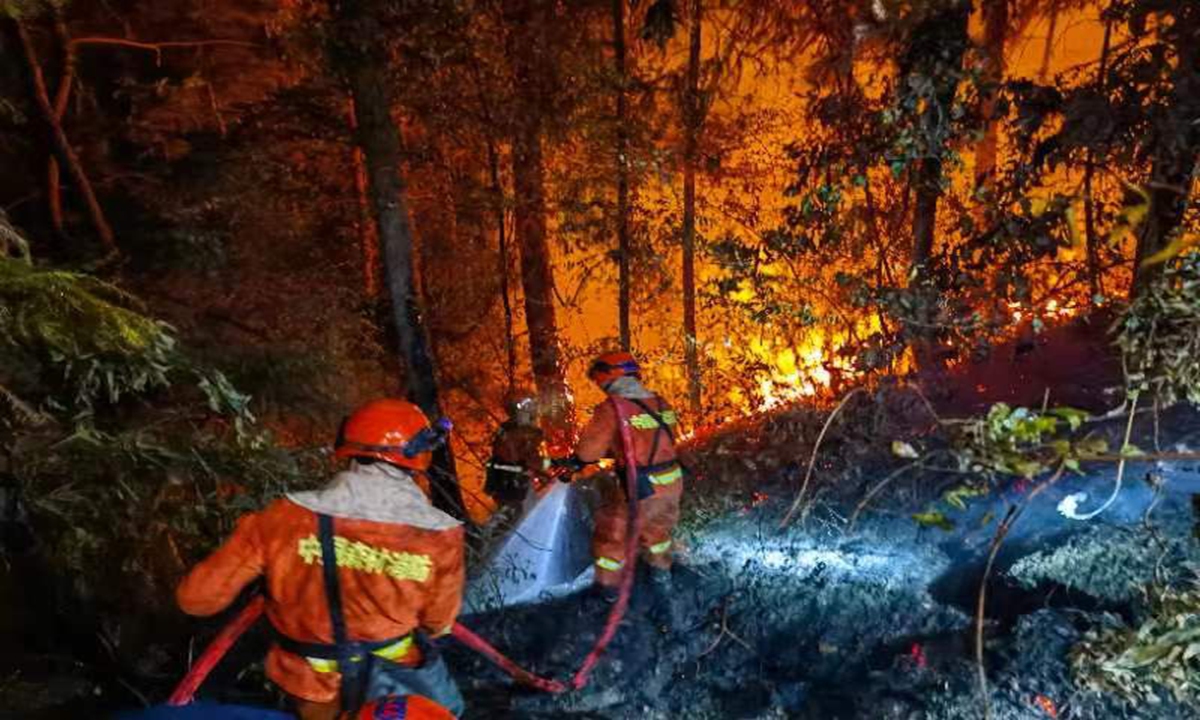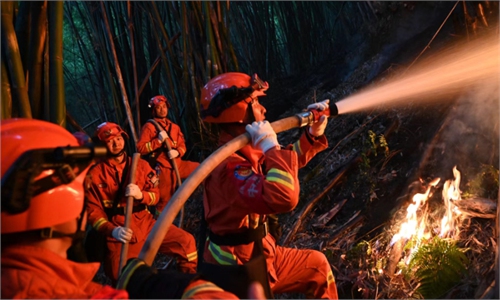Several mountain fires extinguished in SW China’s Chongqing, with rescue teams’ selfless spirit winning applause

Firefighters are putting out the fire in Chongqing. Photo: Courtesy of Kunming forest firefighting branch
The mountain fires in several regions in Southwest China's Chongqing have been finally extinguished on Friday morning with many rescue personnel and volunteers participating in the rescue overnight, once again showing Chinese people's unity in fighting against difficulties. Their selfless spirit won netizens' applause.
As Chongqing has a lack of rescue staff, more than 1,000 rescue personnel from other regions including Northwest China's Gansu and Southwest China's Yunnan provinces have been dispatched to help with the rescue efforts, Chongqing authorities said on Friday. The Chongqing authorities sincerely thanked the forest firefighting teams as they have played a very important role in the battle against the fires.
The authorities also thanked residents for their selfless efforts, such as using motorcycles to take firefighters to the frontline and providing cold water.
Several forest mountain fires have broken out in Chongqing and its surrounding areas due to the extreme hot weather since August 17. Rescue workers and volunteers from Chongqing and neighboring provinces also rushed to the regions to take part in the rescue operations.
Without road lights, rescue personnel on-site in Jinyun Mountain, Beibei of Chongqing, where the mountain fires occurred, used head lamps to light up the way and built walls to prevent the fire from spreading, according to the on-site videos on Thursday night.
At 8:30 am Friday, the fire in Beibei was finally put out and the rescue teams continued to conduct strengthened inspections over the region; the cause of the fire and involved area are under investigation, Chongqing authorities announced on Friday. Another mountain forest fire in Changshou Mountain in Chongqing has also been extinguished, said the authorities on Friday.
The rescue teams used an unmanned aerial vehicle to inspect the on-site situation and dispatched a helicopter with buckets of water to moisturize the regions to prevent the fires from reigniting again, according to on-site videos the Kunming forest firefighting branch sent to the Global Times on Friday.

A fireman is fighting fire in Chongqing. Photo: Courtesy of Kunming forest firefighting branch
'Icy water provided at the supply sites'
At 4:30 am on Wednesday, a total of 304 personnel from the Kunming forest firefighting branch, Southwest China's Yunnan Province, headed out toward the Beibei district of Chongqing, carrying more than 1,800 pieces of various fire-fighting equipment and 55 vehicles.
They immediately participated in pulling out fire operations upon arrival in the region on Thursday. Taking advantage of the low temperature at night, they together with the local fire-fighting forces in Chongqing finally successfully encircled the fire target with the tactics of "controlling fire with fire," Zhang Ruikun from the Kunming forest firefighting department told the Global Times on Friday.
The advantage of this method is that it's highly efficient for putting out fire and does not require special equipment. "It is an effective measure to control large areas and forest fires," but it must be organized by experienced commanders, as blind fire controlling can easily cause larger fires or casualties, according to Zhang.
"We have won!" Waves of cheering came out at around 11 pm on Thursday in Jinyun Mountain in Beibei district of Chongqing, as they finally successfully controlled the fire. The method of "controlling fire with fire" has played a decisive role in putting out the fire.
"I have done this many times, but this is the first time I have ever seen a situation like in Chongqing where all the people are engaged in such a dedicated effort to provide logistical support for frontline fire fighters," Zhang told the Global Times on Friday.
"Whenever you go to any supply point at any time, there will be multiple personnel there providing you with water and food," Zhang said.
Before leaving, the volunteers will also send water and food to us in case we don't have enough to eat or drink after arriving at the front line, Zhang noted. "I really feel warm in heart. As many netizens said, the residents from Chongqing have the spirit of heroes."
The equipment vehicles could not approach the fire line due to the narrow and rugged mountain road, and the whole traffic line would be paralyzed once the vehicles meet from two directions. People in Chongqing organized motorcycle teams to transport food and water to the front line, and many villagers even carried boxes of mineral water up the mountain on their shoulders to rescue personnel, according to Zhang. Volunteers kept a 24-hour duty at supply sites to ensure front-line personnel could drink icy water by transporting homemade ice cubes to cool down the water.

Firefighters are putting out the fire in Chongqing. Photo: Courtesy of Kunming forest firefighting branch
Foreigners played a role
Among the many groups of temporary volunteers in Chongqing, Francis Stonier, a volunteer from the US, also a professor of education at Southwest University in Chongqing, rushed to the fire scene in Chongqing when he discovered that professionals with chainsaws were needed.
Stonier told the Global Times on Thursday that he was so impressed that there were many volunteers with fire extinguishers, giving water to people in need, and some driving motorcycles going up and down mountains to send supplies.
"I was just trying to do my part," Stonier said. "Chongqing is my home. When there's a problem, I certainly felt the need to volunteer and help out. Wish I could do more."
Stonier wrote his experience via his Sina Weibo account. His post received more than 5,500 comments, with many Chinese netizens thanking his kindness and sending blessings to him and his family.
"People like you deserve respect and admiration, no matter where you are from … People like you are the real heroes, no matter who you are serving for," one netizen commented.
It's really a hard-won success, as the terrain of Jinyun Mountain was extremely complex, and the wind was very unstable, plus the extreme high temperature, Zhang said. This is also a major reason why it was difficult to completely extinguish the fire, as the multiple adverse conditions could easily trigger a new fire point, according to Zhang.



